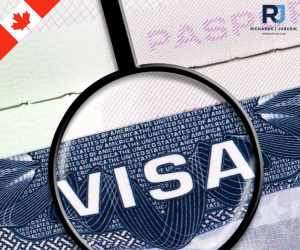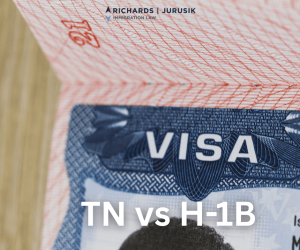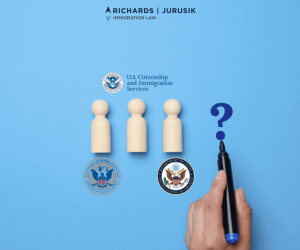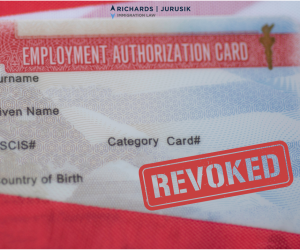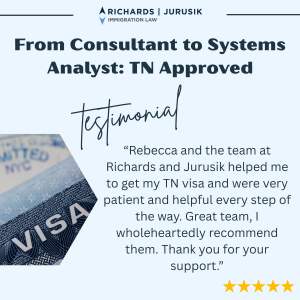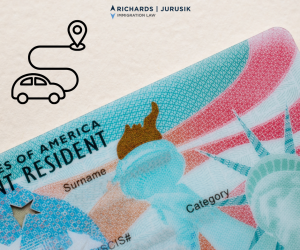The immigration lawyers with Richards and Jurusik Immigration Law have decades of experience providing comprehensive immigration support to businesses of all types and sizes to develop immigration strategies for doing business in the United States.
If your business is sending employees to the United States or expanding your operations into the US, or you are a US company hiring a foreign national, we can help you with your immigration law needs.
Temporary Workers
Most foreign nationals enter the US to work on a temporary basis as nonimmigrants. There are several visa categories available for employers when employing foreign nationals on a temporary basis.
TN Visas for NAFTA Professionals
Canadian citizens and Mexican citizens benefit from the United States Canada Mexico Agreement (USCMA), formerly NAFTA. Under the USCMA, Canadians and Mexicans that work as professionals in any of the 63 USMCA professions and meet the minimum qualifications are able to obtain TN Visa status to work in the United States.
E-1 Visas for Treaty Traders
Foreign businesses from treaty countries that conduct substantial trade with the United States are able to obtain an E-1 registration for their business that enables them to send qualifying employees to the US on E-1 Visas.
E-2 Visas for Treaty Investors
Foreign citizens and businesses from treaty countries with substantial investments in the United States are able to obtain an E-2 registration for their business that enables them to send qualifying employees to the US on E-2 Visas.
H-1B Visas for Specialty Occupations, DOD Cooperative Research & Development Project Workers, and Fashion Models
Foreign nationals who wish to perform services in a specialty occupation, services of exceptional merit and ability relating to a Department of Defense (DOD) cooperative research and development project, or services as a fashion model of distinguished merit or ability, can apply for the H-1B Visa.
L-1 Visas for Business Expansion into the United States
Foreign businesses that are looking to expand their footprint into the United States can do so under the L-1 Visa for Intracompany Transfers, which allows for the start-up of a new business and the transfer of qualifying employees to the US to establish, set up, manage, run, and/or work in the new office.
O-1 Visas for Individuals with Extraordinary Ability
Foreign nationals who possess extraordinary ability in the sciences, arts, education, business, or athletics, or who have a demonstrated record of extraordinary achievement in the motion picture or television industry and has been recognized nationally or internationally for those achievements, can apply for an O-1 Visa.
Other Temporary Work Visas
We also help foreign nationals with all other relevant temporary work visas, including:
- CW-1 Visas for CNMI-Only Transitional Workers (Commonwealth of the Northern Mariana Islands)
- E-3 Visas for Specialty Occupation Workers from Australia
- H-1B1 Visas for Specialty Occupations from Chile & Singapore
- H-2A Visas for Temporary Agricultural Workers
- H-2B Visas for Temporary Non-Agricultural Workers
- H-3 Visas for Nonimmigrant Trainees or Special Education Exchange Visitors
- I Visas for Representatives of Foreign Media
- P-1A Visas for Athletes
- P-1B Visas for Members of an Internationally Recognized Entertainment Group
- P-2 Visas for Individual Performers or Part of a Group Entering to Perform Under a Reciprocal Exchange Program
- P-3 Visas for Artists or Entertainers Coming to Be Part of a Culturally Unique Program
- R-1 Visas for Nonimmigrant Religious Workers
Permanent Workers
If you intend to hire a foreign national on a permanent basis, this is done through sponsorship for US permanent residence—also known as a Green Card.
A permanent resident is someone who has been granted authorization to live and work in the United States on a permanent basis. As proof of that status, a person is granted a permanent resident card, commonly called a “green card.” Learn about the possible paths to permanent residence through employment for foreign nationals, including EB-1, EB-2, EB-3, and EB-4 priority workers, as well as the PERM / Labor Certification process.
Business Expansion into the United States
If you are a foreign company that has not yet established operations in the United States or need to send employees to an affiliated US office, there are several options to consider for expanding your company into the US.
L-1 Visas for Employee Transfers and Business Expansion into the United States
Foreign businesses that are looking to expand their footprint into the United States can do so under the L-1 Visa for Intracompany Transfers, which allows for the start-up of a new business and the transfer of qualifying employees to the US to establish, set up, manage, run, and/or work in the new office.
E-1 Visas for Treaty Traders
Foreign businesses from treaty countries that conduct substantial trade with the United States are able to obtain an E-1 registration for their business that enables them to send qualifying employees to the US on E-1 Visas.
E-2 Visas for Treaty Investors
Foreign citizens and businesses from treaty countries with substantial investments in the United States are able to obtain an E-2 registration for their business that enables them to send qualifying employees to the US on E-2 Visas.
Business Visitors to the United States
Canadian citizens are able to enter the US without a visa as visa-exempt. This allows them to enter the US for acceptable business activities without the need for a visa. However, for durations from 90 days to 180 days, most foreign nationals will require a Visitor Visa to enter the United States.
B-1 Temporary Business Visitor Visas
Most foreign nationals require a B-1 Temporary Business Visitor Visa for business visits to the US. Entry on a B-1 Visa is generally limited to 180 days or less. The longer the visit, the higher the scrutiny, which increases the chance of refusal.
The Visa Waiver Program
The Visa Waiver Program (VWP) is also available to certain foreign nationals. The VWP is similar to the B-1 Visitor Visa and allows visits for qualifying business activities for up to 90 days without the need for a visa.
Our Immigration Resources for Employers
H1B for Canadians on a J‑1 Visa: Your Pathway Explained
TN Visa vs. H-1B: Why They’re Not Interchangeable
Who Decides TN Visa Entry: CBP, USCIS, or DOS?
- E Visas for Traders and Investors
- E1 Trader Visas
- E2 Investor Visas
- Employment-Based Green Cards
- General US Immigration
- H1B Visas for Specialty Occupations
- L1 Visas for International Business
- O1 Visas for Extraordinary Ability
- Other Temporary Work Visas
- PERM Labor Certification
- Temporary Work Visas
- Work Authorization (EAD/OPT/CPT)

